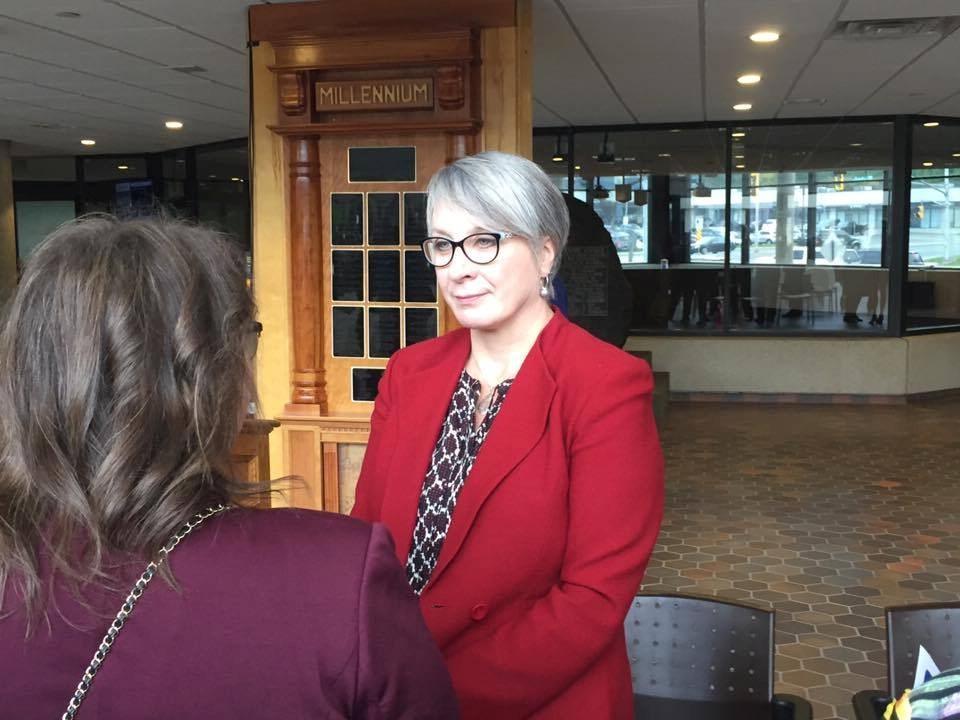While progress is being made, there's still a long way to go before we have real gender parity in this country, says Patty Hajdu, Canada's Minister of the Status of Women.
Speaking on Friday at the kickoff of the Women in Government initiative at Tom Davies Square, Hajdu said one of the biggest challenges is the perception that the battle is over.
"One of the greatest challenges we face is the myth that gender equality already exists and that feminism is no longer necessary,” she said. "We are still struggling. Women have made great strides ... today we see women as mayors and councillors, a number of provinces are led by women premiers and the federal cabinet is 50 per cent women.
"But gender equality remains elusive across all our democratic institutions. In fact, just 26 per cent of municipal councillors across the country are women, and 16 per cent of mayors in this country are women."
While she is part of the first gender balanced federal cabinet in Canada's history, Hajdu said even with a record 88 female MPs, it's still just 26 per cent of all seats in the House of Commons. And women still earn 27 cents less on the dollar than men for doing equal work.
"Clearly, we have more work to do," she said. "The journey for women in politics remains a challenge in a number of ways. For example, and no offence guys, the old boys network is still alive and well."
There are benefits for everyone, she said, when women take equal part. For example, women tend to have healthier approaches to dealing with work stress.
"Women will be open about the feelings that they're having, when they're attacked in the press, when they're criticized for a decision that some don't like, when they're publicly shamed,” Hajdu said. “We talk about it, we cry, we share. Men isolate. They drink. They shut down. So having open conversations is good for both genders.
"Does crying make you weak? I think it makes you stronger."
City clerk Caroline Hallsworth, who organized Friday's initiative, said she and others like her are building on the foundations of people like The Famous Five.
That's a group of five women – Emily Murphy, Irene Marryat Parlby, Nellie Mooney McClung, Louise Crummy McKinney and Henrietta Muir Edwards – who, in 1929, successfully petitioned the Supreme Court of Canada to rule on whether women qualify as persons under the law. There's a statue outside Parliament in their honour.
"These women are not elevated -- their feet are firmly planted on the ground," Hallsworth said. "These were five politically active women who made change that we benefit from today.
"These women, including the Famous Five, had been advocating for the right to vote since the 1890s. As suffragettes, they were instrumental in gaining the right to vote for women. First in the Western provinces, and in 1918, at the federal level."
With the 100th anniversary coming up in 2018, there's extra incentive to promote ways to encourage women to run for office. In total, 34 signed up for Friday's session, Hallsworth said.
"Hopefully, it will lead some of them to (become) candidates in the next election."
Mayor Brian Bigger said there are many examples in the city of women thriving in leadership roles.
"In Greater Sudbury, women represent and lead some of the finest institutions, businesses and public sector organizations," Bigger said. "Believe me when I say that, on council, it's an honour to get to work with my female colleagues and I think we can all agree that we need to do more in encouraging more participation on council."
For her part, Hajdu said she was a single mother struggling to make ends meet, but thanks to her perseverance and the support she received from many people, she's now a cabinet minister.
So if you know a woman you believe would do well in politics, Hajdu said encourage them to get involved.
"Ask her to run. Tell her she has just what it takes. Giver the mentorship, the tools that you have and contribute to her confidence in her ability to win and election, shape our community and country. Got to her events. Give her money. Tell her that she's not dreaming too big"
